Blog
Friends Grieving All Around Us
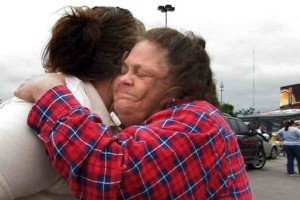
May 27, 2011 by Victoria Noe
There are stretches of time when it feels like there is no good news in the world. Tornadoes, earthquakes, accidents, war, floods…the bad news is relentless.I’ve been in New York for the past week, at Book Expo America and conducting research and interviews for my book. It was intense and exhilarating and exhausting. So was the news: *The search for loved ones in the aftermath of killer tornadoes in the Midwest.*A New York City firefighter, a survivor of 9/11 who never got over the guilt of surviving his brother firefighters in the Deutsche Bank fire, committed suicide.*A sailor just arrived in NYC that day for Fleet Week, was struck and killed by a car on the West Side Highway.Obviously,...
Things You Can Do When a Friend is Dying

May 19, 2011 by Victoria Noe
One of the hardest things about experiencing the death of a friend is figuring out what you can do.Their family may have the essentials covered, or they may live in a supportive community.Maybe not; you won’t know unless you ask.Courtney Strain was dying when she wrote a beautiful, short pamphlet What you can do when a friend (like me) faces the end of life. She wanted people to know that the dying are living every day, and they still need their friends. An excerpt:“Just because I’m dying doesn’t mean I’m any less capable of being your friend. Dying isn’t my whole identity. Let me be a real person in your life. I can talk about other things besides death and...
Dying Matters - For Friends, Too

May 17, 2011 by Victoria Noe
I’m in my best friend’s will.She told me long ago what she was leaving me. It has no value to anyone in her family; in fact, she’d prefer they didn’t open the box at all. It’s a personal keepsake of our past, mostly high school.I think it was when I was in St. Louis for her father’s funeral that I told her there was huge flaw in this plan. “You’re assuming you go first,” I told her. After a moment, she agreed that was problematic. (Plus, I really, really, really would like to have that box now.)This week is Dying Matters week in the UK, a time for people to at least begin the difficult conversations we must have but...
Types of Grievers – Part 3
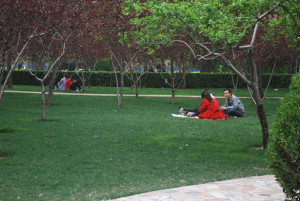
May 13, 2011 by Victoria Noe
Last month I posted about two different types of grievers.Some people channel their grief into action: running errands, organizing, bringing food to the family.Some people are very open with their feelings, talking and crying when they feel the need.Then there are people who do both.I envy them.Those are people who feel comfortable expressing their feelings, even if it’s uncomfortable to others. They cry in front of us, not because they expect us to make everything better, but because they need to cry. When they’re not crying – and sometimes even if they are – they keep busy. They organize the gathering after the funeral service, they make sure everyone at the wake signs the condolence book, they sign for flower...
Flashbacks of 9/11
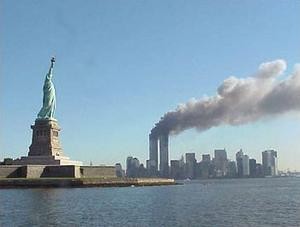
May 12, 2011 by Victoria Noe
Photo courtesy Taunton Gazette The news earlier this month about the death of Osama bin Laden wasn’t entirely good news.I found that every person I talked to about this – without exception – shared some memory of that day almost 10 years ago.Sometimes it was as innocuous as “so-and-so was supposed to be there for a meeting, remember?”Sometimes it was “we really didn’t understand what was going on” (from my daughter, who was 7 at the time).But sometimes the feelings were raw, as raw as they were that day. The comments were passionate and full of a pain that has not eased, even after all this time.Rather than bring “closure” (that word again), the death of bin Laden stirred...
Are Friends Considered "Loved Ones"?
May 10, 2011 by Victoria Noe
I got a request today for a referral to a grief support group for friends.Now, I’ve been doing some occasional research on this for about six months now. My completely unscientific results so far have shown that very, very few grief support groups specifically (that is, in their literature) welcome friends.Why is that?I asked the Executive Director of a well-known agency in Chicago, and she insisted that their general grief support groups welcome friends. When I reminded her that the group description mentions loved ones, she insisted that that included friends.“I’ve never thought ‘loved ones’ meant ‘friends’,” I told her. She was surprised. She assumed that – because she believed it – that everyone accepted that friends are in fact...
The Myth of Closure - Part 3
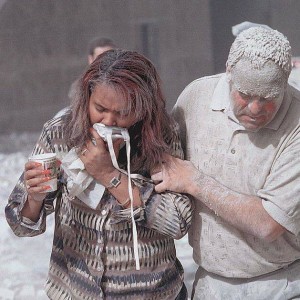
May 06, 2011 by Victoria Noe
It's been quite a week, hasn't it?I’ve been talking to a lot of people this week about closure, as it applies – or doesn’t – to the death of Osama bin Laden.The word has been bandied about in newspapers, blogs, Facebook, Twitter and every news program on TV. My “research” has gleaned the following observations:1. Closure does not end grief.2. Justice does not ultimately equal closure.3. Those who speak most emphatically about closure tend to be observers to the situation, rather than directly affected.4. Those who are most directly affected by 9/11 don’t all see bin Laden’s death as closure.5. Believing there is closure makes people feel better, because they think they will no longer have to witness grief.6. Closure...
The Myth of Closure - Part 2
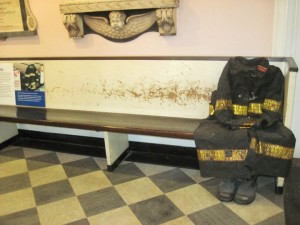
May 05, 2011 by Victoria Noe
Firefighter's PewSt. Paul's Chapel near Ground Zero“I hope it brings some comfort to the families. No closure. That word should be stricken from the English language.” - Lee Ielpi, whose son, Jonathan, a firefighter from Queens, died on 9/11 (quoted in the May 3, 2011 New York Times).Much is made of the concept of closure. We’ve been told that certain things – an anniversary, a verdict, a discovery – can somehow end grief. Closure is considered the act of putting a period at the end of the sentence of grief. Except there’s no such thing. The death of Osama bin Laden has been heralded as closure for those who lost family and friends on 9/11, the end of the grieving....
The Myth of Closure
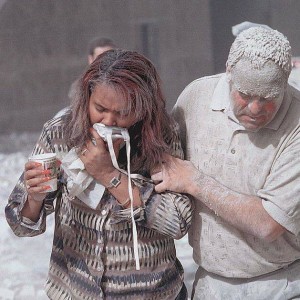
May 02, 2011 by Victoria Noe
“Closure: the sense of finality and coming to terms with an experience, felt or experienced over time.” – Encarta Dictionary“Closure” is a word frequently invoked in grief-related literature. Events are said to bring “closure” to people who grieve: discovery of remains, burial, 1st anniversaries, etc.But the news of the death of Osama bin Laden may only be initially considered closure.Certainly, the death of the most wanted terrorist in the world is a cause for celebration, even not knowing how other terrorist organizations will respond.But for those who lost family or friends on 9/11, there is no closure.Osama bin Laden is dead, but so are their loved ones.Don’t assume everyone is happy and “all right” now. Don’t assume the grieving is...
“Forming Community” – AIDS@30

Apr 28, 2011 by Victoria Noe
The current issue of Chicago’s gay weekly, Windy City Times, includes a guest column I wrote, “Forming Community”.As part of their 9-month “AIDS@30” series, I reflected on my time as a fundraiser in the AIDS community, and what it was like to be a straight woman in a mostly gay environment.You’ll want to bookmark this website, http://www.windycitymediagroup.com/aids.php to read the entire series. If you are of a certain age, you’ll remember a lot. If not, well, you might learn a valuable history lesson or two.
AIDS@30

Apr 25, 2011 by Victoria Noe
This month, Windy City Times started a 9-month series on AIDS@30, in conjunction with the AIDS Foundation of Chicago.The series began with a timeline that will jog your memory if you’re of a certain age, and surprise you if you aren’t. I found myself reading it, thinking to myself, “I forgot about that” or “I remember him.”You’ll find statistics, photos and remembrances. It has already brought back a lot of memories for me.Publisher Tracy Baim was nice enough to ask me to contribute to the series, and I will post when that guest column appears.Visit the Windy City Times website, www.windycitymediagroup.com, and click on “AIDS@30”.The AIDS epidemic is 30 years old, and sadly, not over yet. Through this series, you’ll...
What Kind of Griever Are You? - Part 2
Apr 20, 2011 by Victoria Noe
Everyone grieves differently.Often, people assume that someone who cries or talks about the person who has died is not handling their grief well. They are encouraged to stop crying, to not dwell on the past. But for that person, that’s how they express their grief. Others are what may be defined as “instrumental” grievers. Rather than express their grief by crying, they are more likely to intellectualize their grief. They want to understand their grief, but they don’t want to talk about it. They want to control their grief, so it doesn’t overwhelm them, or surprise them, or distract them.They may also want to ‘do’ things. They may show up with food for the family, or run errands for them....
Online Resources: Dying Matters

Apr 18, 2011 by Victoria Noe
Despite all the hysteria about ‘death panels’, there is a critical need for each and every one of us to thoughtfully consider end-of-life plans. It’s an uncomfortable subject for most people. But avoiding the subjects of where we want to spend our final days and how, what kind of services we want held, and how we want to be remembered will not make them go away.Dying Matters is a UK-based nonprofit coalition. This is from their website:“In 2009 the National Council for Palliative Care (NCPC) set up the Dying Matters Coalition to promote public awareness of dying, death and bereavement. Our members include organisations from across the NHS, voluntary and independent health and care sectors (including hospices, care homes, charities supporting old people,...
The Melody of Friendship
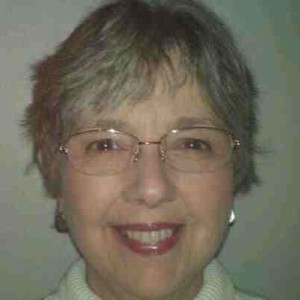
Apr 15, 2011 by Victoria Noe
When I read Viki’s post, “Do You Need Any Help?”, I immediately thought of my best friend, Judy, who died of breast cancer in 1993 after a five year battle. Viki invited me to do a guest post on what it is like to lose a dear friend. Let me tell you about Judy…Where do I begin to describe a friendship of twenty years; a friendship that endured life’s many tough lessons and trials? The diagnosis of cancer, the rigors of single parenting, the challenges of living in a fast-paced world were all intertwined throughout this friendship. We clung to each other through the maze of self-discoveries, growth, career changes, family milestones, achievements and failures.I didn’t realize I would be...
What Kind of Griever Are You? – Part 1
Apr 14, 2011 by Victoria Noe
There is no one way to grieve.There is no right way to grieve.Everyone experiences grief in different ways.Some people let themselves grieve in a physical way. Some clinicians refer to them as “intuitive” grievers. Another word for this type of griever could be “emotional”. Their grief is on display, not held back.Intuitive grievers express feelings that are intense. Crying is probably the most common expression, and it mirrors how they are feeling. Typically, in our culture, expressing grief in this way is considered a female response, rather than male. That also can imply weakness.Crying is not the only physical manifestation of grief for an emotional griever. They may experience prolonged periods of confusion, inability to concentrate, disorganization, and disorientation. Their...
9/11 - When the Therapists Needed Therapists

Apr 11, 2011 by Victoria Noe
"Firefighter Pew" at St. Paul's Chapel, near Ground Zero Karen M. Seeley’s book, Therapy after Terror: 9/11, Psychotherapists, and Mental Health,(Cambridge, UK: Cambridge University Press, 2008) explores a relatively invisible group of September 11 survivors: therapists.New York City was overwhelmed by the need for mental health professionals to help survivors and witnesses cope with the horror of the attacks. To their credit, many came forward in the city as well as from other parts of the country. But helping those who grieve after a terror attack presented challenges never before considered.Most of the therapists were “outsiders”. Firefighters, already a tight-knit, closed society, were unwilling to talk to anyone outside of the department (assuming they talked at all). Unless you...
F is for Friends We Grieve
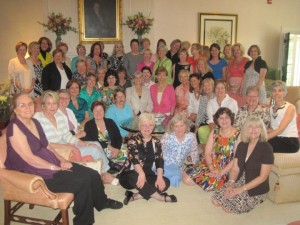
Apr 06, 2011 by Victoria Noe
You would probably be surprised by the number of friends you’ve had in your life: friends from your neighborhood, your school, your church, your first job, your sports team, your theatre group. But life being what it is, you lose touch, maybe geographically separated, maybe just slipping away because your interests changed.Then you go to a reunion, or a party. You skim the alumni newsletter. And you discover they’ve died.Your first reaction may be shock, but your second reaction is likely to be a memory. It might be a memory that now seemed eerie. It might also be a silly or funny memory.My husband and I sat in Holy Name Cathedral in Chicago, three days after 9/11, for an inter-faith...
D is for “Disenfranchised”
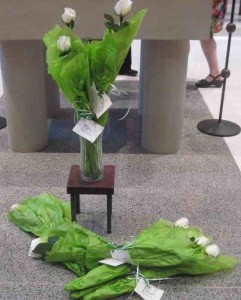
Apr 04, 2011 by Victoria Noe
I’m on an A to Z blog challenge, and today is the 4th day of the challenge. That explains the pithy title. ;)I didn’t know when I decided to write my book that there was such a thing as “disenfranchised grief”, coined by Dr. Kenneth Doka of the College of New Rochelle, in 1989. In the 2002 revision of his Disenfranchised Grief: Recognizing Hidden Sorrow, Dr. Doka observes how the grief a friend experiences can be dismissed:“Often there is no recognized role in which mourners can assert the right to mourn and thus receive such support. Grief may have to remain private. Though they may have experienced an intense loss, they may not be given time off from work, have...
"Longtime Companion"
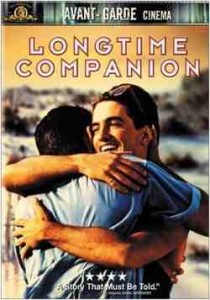
Apr 01, 2011 by Victoria Noe
For many people – certainly anyone under 40 – it feels like AIDS has been around forever. With the spread of the disease around the world, the media focus has actually dimmed. Rarely do you hear of celebrities dying of AIDS. With the development of the so-called AIDS “cocktail” of drugs, those infected can live much longer, healthier lives than anyone could’ve predicted 30 years ago.On July 3, 1981, a story appeared in the New York Times on Kaposi’s Sarcoma, a rare cancer affecting gay men. It is on that day that the film Longtime Companion opens.The first feature-length film addressing the AIDS epidemic, Longtime Companion follows a group of friends through the 80’s. We see the denial, the ignorance,...
"Do You Need Any Help?"

Mar 30, 2011 by Victoria Noe
When someone dies, most people have good intentions. They want to mourn, they want to remember. And they want to help those who are grieving themselves.Often, when you grieve the death of a friend, the focus is on their family. They are the “primary” mourners. They are the ones who get the most sympathy. And families do deserve sympathy and support.The standard question is, “do you need any help?” Now that’s not always the best thing to ask. For one, it puts the burden on the griever to identify and express that need. They may not be thinking clearly enough to do that. It can also come off as insincere, as if the person asking is hoping the answer is no.Even...

